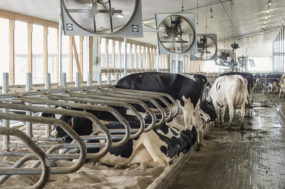The French have more style than we do. I say that in concession, the grievance not coming from American nationalism nor any bad experience as much as regret that I will never have the advantage of being French.
Although they are mocked for pride in their language and teased for being temperamental with food, I have to admit that spoken French does sound nice, and though I’ve never been there, I’m sure their cuisine is excellent. They also know how to dress well. I’ve always maintained that the most average French girl can make herself look amazing.
It’s also evident that they can get away with a lot – if nothing else, because of their accent. Years ago, a friend of mine described a bad date she had with a French guy. She told how he was rude, boring and presumptive – and then ended the story by saying, with a smile, “But he was French.”
Last summer a friend and I booked three nights at a Las Vegas hostel. We arrived both exhausted and with definite plans for the next few days. After we collapsed in the bunks we were approached by a girl with photographs of the nearby Red Rock Canyon on her laptop. We looked at each other and rolled our eyes, knowing she had seen us drive in and was going to ask for a lift.
“Eh, ello. I see zat, you hav, za car … and, za pictures, zay look zo nice …”
By the time she finished her first sentence, not only had we agreed to take her to the Red Rock Canyon the next day but knew that we would give her anything else in the world she wanted.
As it stands now, French agriculture is in disarray. A heavy tax has fallen onto farmers as the government struggles to make up its deficit at a time when quotas and support structures have been absolved by EU policy.
They complain that cheap food from abroad has lowered farmgate prices, sometimes to the point where crops are left in the field to rot. In addition, farmers feel that environmental regulations imposed on them were sudden and costly, while the prices they receive are sometimes below the cost of production.
And so they protested … with style.
In August 2013, masked farmers threw 200,000 eggs at city buildings from the back of pickup trucks. News reports showed images of despondent municipal workers shoveling the yolk as it spilled over the sides of their spades. That fall, they burned crops for everyone to see: eggs, potatoes, hay.
They also set up an effigy of their president François Hollande in the guillotine, suggesting that he receive the same fate as the infamous King Louis XVI. Several months later, hundreds to thousands of farmers drove their tractors into the city streets of Paris. Seven roadblocks were organized, with a line of tractors on the highway as far as could be seen.
The propriety of culture pervades every aspect of French life, including their protests. In March of last year, farmers brought a herd of sheep into the Louvre, one of the largest and most famous art museums in the world.
They forced the sheep down the steps, waving the flag of the farmers’ union as an excited collie propelled the flock from behind. The sheep knocked over the ropes for the queues as they poured into the gallery. It was not without irony that even as a farmer was pulling the lead sheep through the lobby, he was wearing a fashionable scarf.
One of the security guards tried to bump chests with another farmer but did so half-heartedly as the crowd pushed around them. In the end, the sheep stood huddled on the other side of the building, seemingly at ease with their new fame, as Parisians took pictures of them and the farmers’ speeches echoed in the square.
As bold as that stunt was, it would by no means be their finest. One of the grievances of the farmers was the government prohibiting them from spreading manure on their fields. This November, 36,000 people participated in a rally that centered on dumping 100 tons of manure and rotten vegetables on city administration buildings.
The camera footage showed a slurry tank slowly crawling along a main street with a stream that reached the second story of the buildings it passed. Onlookers screamed in giddy disbelief. One sign read in French, “Manure, we can’t use it anymore. You can have it. Help yourself!”
News stories such as these suggest that as different as Western countries may be from one another, the struggle of farming is universal among them. There will always be examples of farmers trying to protect their social-political agency.
I’ll admit, I wouldn’t dare bring a bottle of water in the Louvre if it was forbidden, much less livestock. Even more than the guts of the action, I appreciate the metaphorical implications: The Louvre symbolized the apex of French culture. The farmers are imploring that they’re an important part of that culture too, and one that should not be forgotten.
In the same way, covering the most romantic city in the world in liquid slurry is a rather poignant reminder that it is farmers who help support that city. Again, I find myself jealous of the je ne sais quoi with which the French approach life. And yet again, once more, I find myself hoping that they get their way. PD
Ryan Dennis is the son of a dairy farmer from western New York and a literary writer. The Dennis family dairies and maintains a 100-plus cow herd of Holsteins and Shorthorns.

-
Ryan Dennis
- Columnist
- Email Dennis




